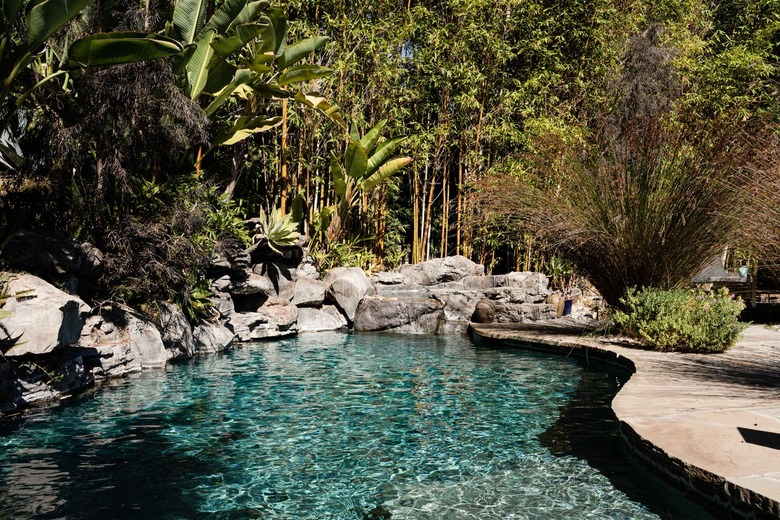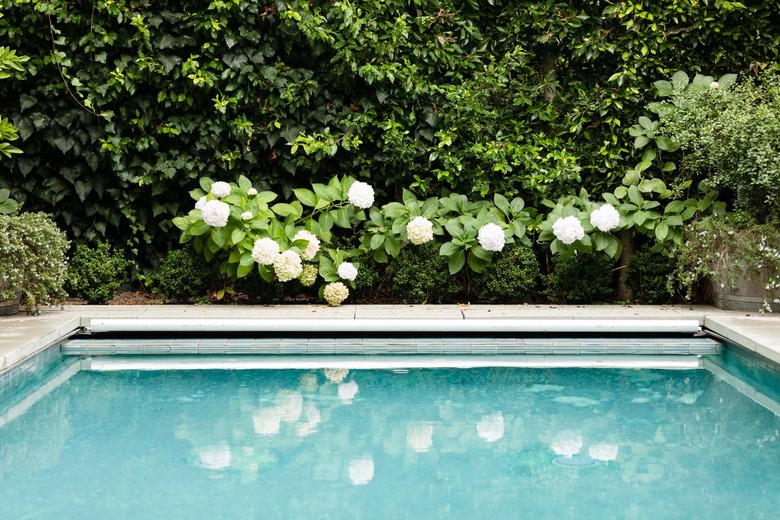How Much Does Pool Installation Cost? (And Tips On How To Hire For The Job)
We may receive a commission on purchases made from links.
Whether you prefer to lounge or swim laps, no one can deny the luxuriousness of a swimming pool in the backyard. Not only does a swimming pool elevate the backyard's aesthetics, but it also provides hours of outdoor entertainment — and a natural place for neighbors, friends, and family to gather during the summer.
But a pool is a big-ticket item, and hiring a pool company to design and build an in-ground pool to transform your outdoor living space means pulling permits, digging a (very large) hole, and installing pumps and other equipment to keep the pool running safely and efficiently.
Ready to make a big investment in your backyard? Here's how much pool installation costs — and how to hire for the job.
Tip
Though the cost of a swimming pool can vary, generally you can expect a concrete in-ground pool to cost between $35,000 and $80,000, a fiberglass pool between $20,000 and $60,000, and a vinyl liner pool to cost between $20,000 and $40,000. The size of the pool and custom touches affect the total cost.
Swimming Pool Costs
Swimming Pool Costs
There's no way around it: Installing a pool is very expensive. However, if you are planning on staying at your home long-term and know you're going to be enjoying the pools for years to come, the investment in your backyard entertainment zone is well worth it to some. A typical turnkey pool package includes the pool itself, PVC plumbing for drains and returns, electrical work, pump, and a filter.
As far as average costs go, this will largely be dependent on the size and material. For a pool with a gunite shell, expect to pay $35,000 to $80,000. For a vinyl pool, the cost will be about $20,000 to $40,000. A fiberglass pool will cost $20,000 to $60,000. However, once you start adding upgrades, the costs will go up.
For example, adding a salt water system will increase the overall cost by up to $2,000. Salt water systems use a chlorine generator to turn special pool salt into chlorine. This eliminates the need to sanitize the water by adding chlorine tablets or liquid, which will save on maintenance costs in the long run (but unfortunately cost you some funds upfront).
Another upgrade to your basic in-ground swimming pool installation is choosing what kind of coping caps you'll get. All in-ground swimming pools have coping around their edges, which prevents water from getting behind the pool walls. Upgrading from basic poured concrete coping will increase the cost — with concrete pavers costing $20 to $30 per linear foot, brick at about $25 to $30 per linear foot, and natural stone at $45 to $55 per linear foot.
Other add-ons to the basic pool package include:
- Pool decking: $3,000 to $12,000 depending on size and materials
- Pool heaters: $1,500 to $4,500
- Waterfalls: $1,500 to $6,000
- Slides: $1,000 to $14,000. Slides can get very complicated, with features like special lighting and water jets.
- Diving boards: $400 to $1,000. (Note that some building codes set standards for diving boards as well as pool depth at the diving site.)
- Spa or hot tub: $5,000 to $10,000 for a spa installed on a concrete pad. In-ground spas can cost up to $20,000.
- Waterline tiles: The pool builder may offer tile options for the area from the waterline to the top of the pool wall. Ceramic is $1 to $30 per square foot. Porcelain is $2 to $50 per square foot. Natural stone, such as granite or marble, is $5 to $40 per square foot. Glass is $10 to $55 per square foot. You can tile gunite and fiberglass pools. You can also tile a vinyl pool but be aware that the vinyl liner will need replacement every 10 to 15 years.
- Lighting: $100 to $400 per fixture.
- Pool covers: $500 to $2,500, and those that operate at the touch of a button can cost up to $15,000. (Note that pool covers are not really an option because some are required by code. They provide a safety measure, and they protect the pool during the off season.)
- Pool fences: $2,000 to $12,000 or $15 to $50 per linear foot. Building codes require fences around pools, and they are part of a common-sense pool safety package.
What a Swimming Pool Builder Does
What a Swimming Pool Builder Does
After knowing what kind of average investment you'll need to make, you'll then need to decide what type of professional you want to hire — with some operating independently and others part of a franchise in a larger corporation. The company you select may do all of the work itself, or it may hire subcontractors for certain tasks, such as excavation or electrical work. But no matter what type of company, a swimming pool builder will help you throughout the design and installation process.
In addition to building and installation, some companies provide pool maintenance services and operate retail stores that sell swimming pool equipment. Others offer landscaping services, install water features, outdoor kitchens, patios, and anything else that will complete your outdoor living space.
Each type of swimming pool has its own installation requirements, but the general processes are similar. The swimming pool builder will typically do the following:
- Visit your home to take measurements and discuss your design plans (such as pool type or pool shape) as well as your budget.
- Assess the condition of your yard in regard to slopes, type of soil, and existing plants.
- Develop a plan for the project that will be presented to you for approval. This step may involve a number of revisions.
- Obtain the necessary building permits and schedule inspections.
- Excavate the site for the pool. This will turn your yard into what you think is a chaotic mess, and it is jarring to many homeowners, but it is a necessary step that will be cleaned up by the end of the project.
- Install the plumbing and electrical lines as well as the pumps, filters, and other equipment.
- Build or install the pool's shell. (Gunite and vinyl pools are built on-site, but fberglass shells are fabricated in a factory and trucked to the pool site.)
- Apply the interior finish to the pool.
- Fill the pool and turn on the equipment.
- Provide pool upkeep information to the homeowner.
Doing Your Homework
Doing Your Homework
Knowing the type of pool you want can help narrow your search for a pool builder, but there are things to find out before signing the contract.
Contact your local building department to determine if your property is subject to a limit on impervious surfaces. An impervious surface does not allow water to soak into the ground, such as driveways, patios, and in some places, swimming pools. Some towns limit the amount of impervious surface area to limit storm runoff that flows into storm drains and bodies of water.
You should also become familiar with the requirements for pool fences. Most localities follow the recommendations of the Consumer Product Safety Commission for pool barriers. Among other provisions, the fence should be at least 48 inches high, and the gates should be self-closing and self-latching. Basically, the fence should be capable of keeping a small child out of the pool area when an adult is not present. Your town may have other requirements.
Pools require regular maintenance, and sometimes, problems will require your attention throughout the pool season. You can do all of the work yourself or hire a pool service company to make regular visits and take care of the maintenance, but many homeowners use a hybrid approach. They maintain the pool throughout the swimming season, but they hire a professional service to open the pool in the spring and close it at the end of the season.
When You Should Hire a Pool Builder
When You Should Hire a Pool Builder
Building a pool is like any other major home renovation project: It takes a number of different skills to put together the finished project, especially if additional construction and landscaping are involved, and that takes time. But when exactly should you hire someone to do the job (especially considering you want to enjoy your pool during the peak summer season)?
The actual pool construction can take from six to 12 weeks, but the planning and the permitting process usually take longer than expected. For complicated projects, the plans can go through a number of revisions and changes. It can take up to two months to obtain the necessary permits because pool plans are often reviewed by the town engineer before they go to the building department for approval.
The best time to start planning for a pool and looking for a pool builder is in the fall, with the idea of having the pool built and filled by the time the warm weather comes around the following calendar year.
Questions to Ask a Pool Builder Before Hiring
Questions to Ask a Pool Builder Before Hiring
Getting references from friends and family is a good way to assemble a list of potential pool builders. Some questions to ask candidates include:
What type of pools do you build? Make sure the pool contractor specializes in the type of pool you want and has a solid history of similar past projects.
What services do you offer? Some companies will only build the pool, but others also include pool design, landscaping, building pool decks, and constructing fences. A good pool builder can recommend other contractors for the other projects in your outdoor living space.
Is there sufficient access to my yard for your equipment? Fiberglass pools are shipped as complete shells and usually require the use of a crane to lift them into position.
Can you show me proof of insurance? A pool builder should carry both liability insurance and workers' compensation insurance.
Are you licensed and/or certified? Some states require pool builders to be licensed. Others may require a general contractors' license. Pool builders can obtain certifications from professional organizations, such as the Pool and Hot Tub Alliance. This organization provides certifications for pool builders as well as pool technicians and swimming pool maintenance providers.
Can you provide references of past jobs? A good company will provide photos and even videos of past jobs. Follow up by contacting the owners and asking about the job.
Do you use subcontractors? If the company does, make sure the principal pool company obtains mechanics' lien waivers. These waivers certify that the subcontractors and suppliers have been paid for their work. If they haven't, the contractor or a supplier can place a lien on your house.
What is the payment schedule? Most pool builders will require a deposit of about 10 to 20 percent when the contract is signed. The actual amount may be regulated by state law. Then there will be payments at specific milestones during the project, such as when excavation is completed or when the pool shell is in place. It varies from company to company. Structure the contract so that you reserve 10 to 20 percent of the project cost for the final payment.
Additional questions to ask:
- How long will construction last?
- What are the warranties on workmanship?
- What are the warranties on the pool equipment?
- Do you provide instructions on how to operate the equipment?
- Do you provide maintenance instructions?

